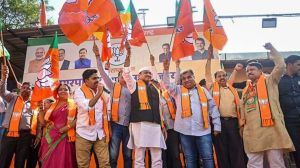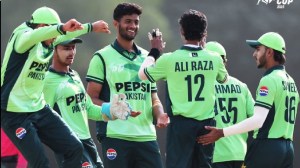NOW THAT the Maharashtra Assembly has unanimously passed a Bill to set aside 10% reservation for the Marathas under socially and educationally backward categories in jobs and education, the question on everyone’s minds is, will it clear judicial scrutiny.
The Bill was formulated based on a report of the Justice (retired) Sunil B Shukre-led Maharashtra State Backward Class Commission (MSBCC). However, at least two previous legislation extending quota to Marathas have failed legal challenge, which was the point on which the Opposition tried to pin the Eknath Shinde-led government on Tuesday.

One common thread running through the three bids has been that all came in the run-up to elections.
* Narayan Rane committee
In a first bid for a special law for Marathas, the then Prithviraj Chavan-led Congress government brought in an ordinance giving 16% reservation in government jobs and education to the community, ahead of the 2014 elections. It was based on the recommendations of a Narayan Rane-led committee, which was not a statutory backward class commission.
The ordinance was challenged before the Bombay High Court, and it stayed the move in its interim order of November 2014. In the same year, the Supreme Court refused to vacate the stay.
In 2015, the BJP-Shiv Sena government led by Devendra Fadnavis turned the ordinance into an Act, which was passed in the Assembly. However, a year later, the Bombay High Court stayed the Act for its resemblance to the ordinance.
In 2017, the Fadnavis government set up the Maharashtra State Backward Class commission under Justice (retd) M G Gaikwad of the Bombay High Court.
Story continues below this ad
* Gaikwad Commission
The Gaikwad panel gave its report in November 2018, after a survey of 43,629 families, with at least two villages picked from each of the 355 talukas in the state where Marathas made up more than 50% of the population.
The report said that 76.86% of the Maratha families were engaged in agriculture and agriculture labour (combined), 6% were in government and semi-government services, 3% in private services, 4% in trade and industry, and 9% in non-agricultural physical labour.
It also found that 13.42% of the Marathas were illiterate, 35.31% only had primary education, 43.79% had finished high school, and that the numbers dropped to just 6.71% for those who had finished graduation or post-graduation, while only 0.77% were technically and professionally qualified.
On the basis of this, then CM Fadnavis brought in Maharashtra’s Socially and Educationally Backward Class (SEBC) Act, 2018, providing the Marathas 16% quota overall in education and government jobs.
Story continues below this ad
The legislation was first challenged in the Bombay High Court, which ruled that the quota granted under the Act was not “justifiable”, and reduced it to 12% in education and 13% in government jobs.
The matter went to the Supreme Court, and in May 2021, a Constitution Bench struck down the quota altogether, noting that the Maharashtra government had failed to prove any exceptional circumstances or provide sufficient empirical data regarding the Marathas to justify exceeding the 50% quota ceiling.
The Court also referred to the findings of the Gaikwad Commission that over 30% Marathas were in public service, and said the Gaikwad panel and High Court had failed to take into account that “Marathas are the dominant forward class and are in mainstream national life”.
The Court said the Gaikwad commission ought to have focused on what had happened since 2008 that the Marathas had become a backward class – the National and State Backward Class Commissions prior to 2008 had rejected the Maratha community’s claim to it.
Story continues below this ad
At the same time, the Court “left it open to the State to collect relevant data to find out whether a particular case or community is to be included in the backward class”.
It was based on this that the Justice Shukre panel was formed, with the Shinde government’s brief for it being to go in for a large-scale survey, to ensure there was sufficient empirical data to justify Maratha reservation.
* The Shukre Commission
The committee to determine the status of the Marathas was set up in December 2023 with Justice (retd) Sunil B Shukre of the Bombay High Court as chairperson. Over the past two months, the Commission claims to have surveyed 1,58,20,264 families across the state.
The Shukre commission notes that the population of Marathas in the state is 28%, while 84 % of them are not advanced, adding that such a large backward community cannot be added into the OBC bracket.
Story continues below this ad
The Commission describes extreme poverty, decline in agricultural income, and partitions in land holdings as reasons for the current status of the Marathas. It also notes that 94% of farmers who have died by suicide in the state belonged to the Maratha community.
The panel finds inadequate representation of the community in all sectors of public services, and says the Marathas have remained “completely out of the mainstream” due to their backwardness.
It calls for separate reservation to the Marathas to increase their representation in government jobs and developed sectors.
The Opposition has targeted the Shinde-led Sena-BJP-Ajit Pawar NCP government saying the new law is likely to be challenged in court too. Rohit Pawar, an MLA belonging to Sharad-Pawar led NCP, said there were many errors in the draft of the Bill and that it was not clear about the basis of the decision “to give 10 percent reservation while showing 28% population for Marathas”, he posted on X.
Story continues below this ad
“The government’s attempt to bring a Bill in haste in the run-up to the elections should not mislead the common man,” Rohit added.

































